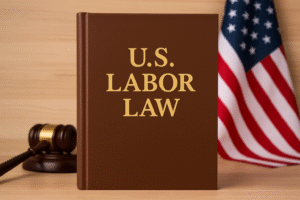
U.S. Labor Law: A Comprehensive Guide (2025)
U.S. labor law forms the legal foundation for protecting workers across all industries. It governs wages, hours, discrimination, union rights, workplace safety, and more. As the job market evolves, understanding labor laws is essential for both employees and employers. This guide offers an in-depth look at federal labor law, key statutes, and recent updates for 2025.
Last Updated: June 24, 2025
What Is U.S. Labor Law?
U.S. labor law consists of federal and state regulations designed to balance the rights of workers and employers. These laws are enforced by agencies like the U.S. Department of Labor (DOL) and the Equal Employment Opportunity Commission (EEOC).
The cornerstone of labor protection is the Fair Labor Standards Act (FLSA), which governs:
- Minimum wage
- Overtime pay
- Recordkeeping
- Child labor standards
Key Federal Labor Laws
1. Fair Labor Standards Act (FLSA)
The FLSA sets the federal minimum wage, mandates overtime pay (1.5x regular pay) for hours worked beyond 40 in a week, and restricts youth employment.
2. National Labor Relations Act (NLRA)
The NLRA protects the rights of workers to form unions, bargain collectively, and engage in concerted activities. It prohibits unfair labor practices by employers and unions alike.
3. Occupational Safety and Health Act (OSHA)
OSHA ensures safe and healthy working conditions by enforcing standards and offering training and assistance.
4. Family and Medical Leave Act (FMLA)
Eligible employees are entitled to up to 12 weeks of unpaid, job-protected leave for family or medical reasons.
5. Equal Pay Act & Civil Rights Act (Title VII)
These laws prevent wage discrimination and protect employees from discrimination based on race, gender, religion, and national origin.
Worker Rights Under U.S. Labor Law
U.S. employees are granted several fundamental rights under labor law:
- The right to a minimum wage (currently $7.25 federal, though many states have higher rates)
- The right to overtime pay
- The right to a safe workplace
- The right to unionize
- The right to be free from discrimination
Recent legislative proposals aim to increase the federal minimum wage and strengthen union protections. Always check for state-specific labor law variations.
2025 Updates to U.S. Labor Law
In 2025, several key updates were introduced:
- Proposed Federal Minimum Wage Increase: A bill to raise the federal minimum wage to $15 is pending.
- Gig Worker Protections: New regulations are being tested to ensure benefits for gig economy workers.
- Remote Work Standards: The DOL issued guidance to clarify wage and hour laws for remote employees.
- Stronger Penalties for OSHA Violations: Increased fines for repeat safety violations were implemented.
These developments reflect a growing focus on non-traditional work environments and enforcement strength.
Labor Unions and Collective Bargaining
Unions play a critical role in labor law enforcement. They negotiate collective bargaining agreements (CBAs), represent workers in disputes, and advocate for better conditions.
Employees covered by CBAs often receive higher wages, stronger benefits, and job security. The NLRA supports these rights, but union membership varies widely across industries.
State vs. Federal Labor Laws
States can set stricter labor standards than federal law. For example:
- California and Washington have higher minimum wages
- Some states mandate paid sick leave
- State OSHA programs can exceed federal requirements
Always review both federal and state labor regulations applicable to your workplace.
Frequently Asked Questions (FAQ)
Is my employer required to give me breaks?
Federal law does not mandate meal or rest breaks, but many states require them. Check your state labor department’s rules.
Can I be fired for joining a union?
No. It is illegal for an employer to fire or retaliate against you for union involvement under the NLRA.
Am I entitled to overtime if I’m salaried?
Some salaried employees are still eligible for overtime depending on their job duties and pay level. Refer to the FLSA’s “white-collar exemptions.”
What protections exist for gig workers?
While gig workers are not always covered by traditional labor laws, new regulations are expanding protections, including minimum compensation and limited benefits.
Disclaimer
This article is intended for educational purposes only and does not constitute legal advice. For specific employment issues, consult a licensed labor attorney or your state’s labor board.
Internal Links:
- “employee rights in the workplace” →: https://uslawguide.net/employee-rights-overview
- “state labor laws by region” →: https://uslawguide.net/state-labor-law-guide
External Links:
- “U.S. Department of Labor – FLSA Overview” →: https://www.dol.gov/agencies/whd/flsa
- “OSHA Worker Safety Guidelines” →: https://www.osha.gov/workers